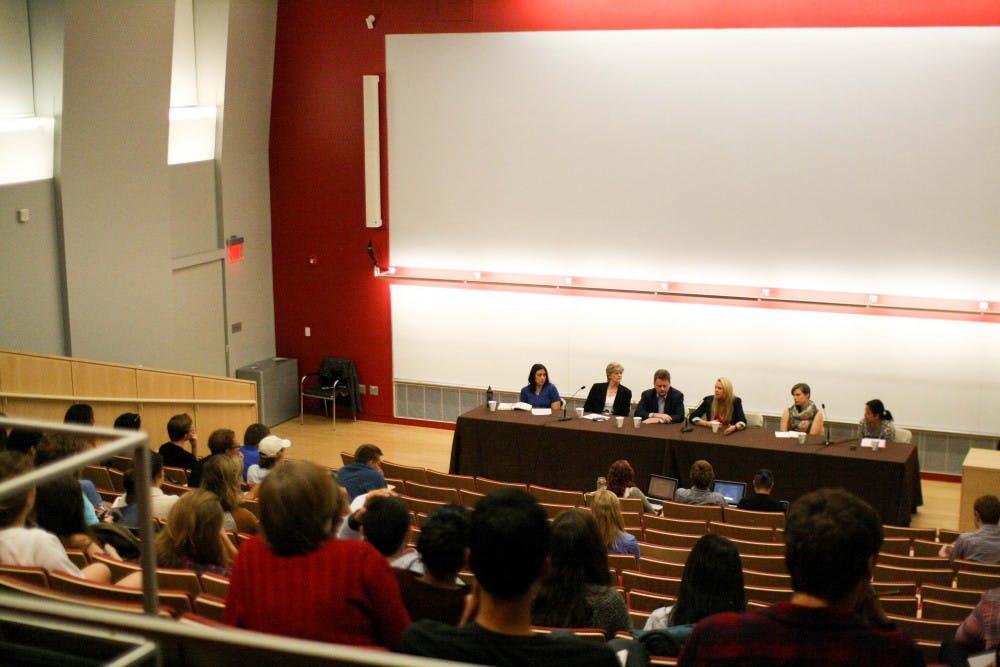Issues related to the University’s updated Title IX policy, including the designation of “responsible employees” and the complaint process, surfaced as major topics of discussion at an open forum hosted by the Undergraduate Council of Students Wednesday.
The open forum came on the heels of the release of survey results from the Association of American Universities that showed that 25 percent of female undergraduates at Brown have experienced sexual assault — attempted or completed non-consensual penetration or non-consensual sexual touching by force or incapacitation — since enrolling.
Students submitted questions online before the forum, and three student representatives from the Title IX Oversight and Advisory Board posed these questions to administrators.
Since the Sexual Assault Task Force released its final report last spring, the University has made a number of changes to the system it uses to handle alleged Title IX violations. The new process for handling an alleged violation will be less “adversarial and traumatic,” said Russell Carey ’91 MA’06, executive vice president for planning and policy.
In the past, the process centered on a one-day hearing, said Amanda Walsh, Title IX program officer. Students would submit statements and prepare questions for those involved with a case, and all evidence would be considered during the hearing.
The altered procedure is an “investigation model,” in which an investigator is assigned to the case, speaks with all parties involved and compiles a report that is then presented to the Title IX Council, Walsh said. This body, composed of six students UCS helped select, will decide for or against the respondent and recommend the sanction, if necessary.
While Walsh and Carey addressed most of the questions, they sat alongside four other panelists: Mary Grace Almandrez, interim assistant vice president for campus life and student services; MaryLou McMillan, interim assistant vice president for campus life and student services; Liza Cariaga-Lo, vice president for academic development, diversity and inclusion; and Sara Matthiesen, a postdoctoral student and former member of the Task Force on Sexual Assault who now works in the Title IX Office.
Changes to the handling of Title IX cases also extend to the treatment of those involved with the case. There will be “greater clarity regarding interim measures,” Carey said, including a penalty of separation for the respondent that will take effect during any appeals process following an initial ruling by the Title IX Council.
Walsh stressed the fact that a Brown community member need not make an official complaint in order to secure access to certain resources and services, such as a no-contact order. That can be done “with no intention ever to file a complaint,” she said.
The panelists addressed concerns about ambiguities surrounding the roles of students who have signed on as “responsible employees,” including Residential Peer Leaders, Women’s Peer Counselors, Minority Peer Counselors and Meiklejohn Peer Advisors. Walsh said increasing the transparency surrounding the responsibility that these roles entail is crucial moving forward. “Students don’t know that the leadership position puts them into the ‘responsible’ category,” she said.
After addressing the initial questions submitted online, the panelists opened up the floor to audience members in a question-and-answer session.
In response to a comment from Rohan Gulati ’17 about the lack of a mechanism for hearing the concerns of the respondent, Walsh said the completed investigation report would be provided to the respondent in addition to the complainant. The respondent would also be given the opportunity to submit a written response, she said.
Daniella Dichter ’17 asked whether the new process “shifts the burden of proof to the respondent.” Carey responded that the process is not meant to follow a traditional legal framework. “It’s an educational process,” he said. Trying to attach legal terminology to it “misses the point,” he added.
“The policy is not in place to get certain people in trouble,” Matthiesen said. “It’s in place to hold everyone to the same bar.”
Kathleen Finn ’16 asked whether students who could not afford to hire an attorney would be offered financial assistance or other accommodations in the process. “Every student has the right to an advisor, and that could include an attorney,” Walsh said. The Office of the General Counsel will work with parties in the case to ensure access to adequate representation, she said.
Correction: A previous version of this article misquoted Russell Carey as saying that the process for handling Title IX complaints would be less "adversarial and dramatic." In fact, he said it would be less "adversarial and traumatic." The Herald regrets the error.





